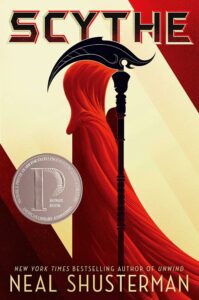Scythe is the first in a gritty dystopian trilogy about a society in which no one can die… unless a scythe gleans him or her. And scythes have a quota to fill….
Scythe (Arc of a Scythe #1) by Neal Shusterman. Simon & Schuster, 2017 (reprint). 464 pages.
- Reading Level: Teens, ages 15 and up
- Recommended For: Teens, ages 15 and up (note considerations)
Scythes: The Solution for Human Immortality

Citra didn’t see the visitor, as he was, at first, hidden from her view by the door when it opened. What she saw was how her mother stood there, suddenly immobile, as if her veins had solidified within her. As if, were she tipped over, she would fall to the floor and shatter.
“May I enter, Mrs. Terranova?”
The visitor’s tone of voice gave him away. Resonant and inevitable, like the dull toll of an iron bell, confident in the ability of its peal to reach all those who needed reaching. Citra knew before she even saw him that it was a scythe.
~Scythe, chapter 1
In a world in which death by natural causes has been eradicated, the human population must be artificially kept under control. After all, the planet can only support so much life. Scythes are the solution: men and women who undergo specific, careful training in the art of taking human life with dignity and according to certain quotas. Scythes have 10 commandments, including the injunction that they must never take life because of “bias, bigotry, or malice aforethought.” Some of the commandments are monastic (no luxuries, spouses, etc.), and some seem bizarre to our mortal ears, particularly the first: “Thou shalt kill.”
Scythe is gritty, but thought-provoking
For all its emphasis on death, Scythe is a thought-provoking dystopian novel. Set in a futuristic age, beyond the “mortal age” (our current one), the entire construct of the novel is an artifice. Other dystopian novels, like The Giver, also reckon with how to mete out death. Scythe takes it one step further, showing how scythes go about their business. Two young apprentices spend the bulk of the novel learning their new vocation: weapons training, wisdom in how to go about their gleaning selections, and mastering the art of death. But the real crux of the novel revolves around what it means to be human. Since humanity no longer has to fear death (even death by scythe is sporadic and statistically unlikely), humans have lost the ability to truly understand art, literature, and music from the mortal age. They do not suffer (all physical ailments, even accidental death and aging, are rapidly cured by healing nanites), and thus they cannot fully grasp the urgency of love, passion, growth, or even trials. Scythes themselves must grapple with this, even as they are tasked with administering ultimate justice to the humans around them. And some scythes take up the mantle gravely, viewing their vocation as an honor. Other scythes begin to relish gleaning and treat it more like, well, killing.
Another salient feature is the over-arching power of the Thunderhead: an all-knowing tech brain that controls everything and everyone except the scythes. Imagine: our smart homes, smart phones, smart cars, and more—all connected. Alexa or Siri merged into one mass brain that sees all, knows all, and has limitless power to act. The Thunderhead is amoral, representing the ultimate good to most of society; it doesn’t have feelings, so it never acts with bias or out of vengeance or because it likes one person better than another. Thus, humanity trusts it implicitly; the Thunderhead knows best. The interaction between scythes, the Thunderhead, and ordinary humanity is one Schusterman explores thoughtfully, especially considering that he wrote the book in 2016—practically the Dark Ages when it comes to smart tech given its rapid rate of growth and expansion. ChatGPT was a mere blip on the horizon back then.
I often wonder, should the Scythedom run entirely off the rails and decide to glean all of humanity in a grand suicide of global gleaning, would the Thunderhead break its noninterference law and stop it? Or would it bear witness again as we destroyed ourselves, leaving nothing behind but a living cloud of our knowledge, accomplishments, and so-called wisdom?
Would the Thunderhead grieve our passing, I wonder? And if so, would it grieve as the child who has lost a parent, or as the parent who could not save a petulant child from its own poor choices?
~from the gleaning journal of H. S. Curie (p. 294)
Scythe Raises Good Questions
In summary, Scythe is a typical dystopian novel. Individual characters aren’t fleshed out as much as they might be in a realistic fiction novel, and situations and elements are gritty. Ideas are front and center, consequences of current fixations in society (like our love of smart-tech) are placed under the microscope, and an imagined future forces readers to stop and examine both themselves and society. Scythe asks more questions than it answers, but they are good ones for readers who are mature enough to dive in: What really makes a human? What is essential to our humanity? What should the role of artificial intelligence be? Do humans ever have the right to assume control over other human’s lives? Do we get to choose the manner in which our own lives play out? If there were no mortal consequences, how would we then live?
Considerations:
These considerations below are to give you a feel for the kind of book this is more than try to point out each possible instance. As with most dystopian novels, there are objectionable elements. Generally, these serve to illustrate the depravity of a given character or the society as a whole. Personally, I found Scythe less objectionable/gritty than a book like Brave New World, more edgy than The Giver or The Hunger Games.
- Language: Profanity (3 lower-case “g-o-d”; two “d—” under provocation, 5 d— casually), crude/vulgar PG-13 level language (“pissed off,” 2 “crap,” 2 “a–,” “smart-a–“).
- Sexuality: Casual mention of same-sex couple, one reference to “lewd liaisons” made as a joke (same-sex), occasional mentions of hormones/hormonal attraction between two teenagers of the opposite sex, one acknowledgement that two heterosexual adults had at one time been lovers
- Violence/Death: Obviously, in a book about death and those administering death by various weapons, instances abound in which a person dies or suffers bodily harm.
Overall Rating: 3.75 out of 5
- Worldview/Moral Rating: 3.75 out of 5
- Literary/Artistic Rating: 4.00 out of 5
Read more about our ratings here.
Recommended Reading at Redeemed Reader
- Book Review: The Hungry Cities Chronicles by Reeves (includes Mortal Engines, now a movie): another dystopian series your teens may enjoy
- A Resource: Authority v. Anarchy: A Book List (this list contains more than dystopian books, but revolves around some similar issues)
- A Reflection: Philosophy, Science, Ethics: The Need for Science Fiction
We are participants in the Amazon LLC affiliate program; purchases you make through affiliate links like the one below may earn us a commission. Read more here.
Stay Up to Date!
Get the information you need to make wise choices about books for your children and teens.
Our weekly newsletter includes our latest reviews, related links from around the web, a featured book list, book trivia, and more. We never sell your information. You may unsubscribe at any time.
Support our writers and help keep Redeemed Reader ad-free by joining the Redeemed Reader Fellowship.
Stay Up to Date!
Get the information you need to make wise choices about books for your children and teens.
Our weekly newsletter includes our latest reviews, related links from around the web, a featured book list, book trivia, and more. We never sell your information. You may unsubscribe at any time.
We'd love to hear from you!
Our comments are now limited to our members (both Silver and Golden Key). Members, you just need to log in with your normal log-in credentials!
Not a member yet? You can join the Silver Key ($2.99/month) for a free 2-week trial. Cancel at any time. Find out more about membership here.



